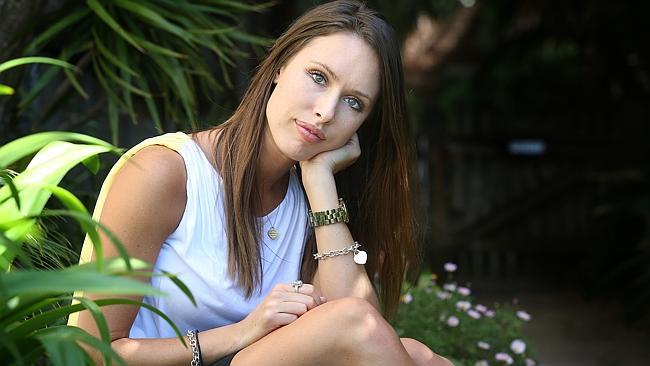Day ICAC men came knocking: ‘We’re above police’
Investigators arrived at the home of Sophia Tilley, the girlfriend of Margaret Cunneen’s son, demanding her phone.

Investigators from NSW corruption watchdog ICAC told Sophia Tilley they were “above the police” when they unexpectedly arrived at her home and demanded she hand over her mobile phone.
It was three months after she had been the victim of a car accident, in May last year, when a pizza delivery man drove into oncoming traffic, turning her car on its side.
The 26-year-old, whose father is a property developer and whose boyfriend is the son of prosecutor Margaret Cunneen SC, could not fathom why secretive men in dark suits would turn up at her home in the early morning to demand she hand over her phone.
“There were these guys in suits. They were really solemn and they knew our names. They said, ‘We’re going to need to take your phones’,” Ms Tilley told The Australian in her first interview.
“We said, ‘We need our phones for work, who are you, why would we give you our phones?’
“They said, ‘We’re ICAC.’
“I said, ‘You’re not the police, I don’t know what ICAC is or who you are, we’re not going to give you our phones, why would we?’
“They said, ‘We’re above the police.’ They said ‘if you don’t you’ll face five years in prison’. They said, ‘Trust me, this is in your best interest to do what we say, we’re the guys who got Eddie Obeid.’ That’s how they tried to identify themselves.
“I don’t watch the news so I didn’t know who Eddie Obeid was.”
Initially thinking the ordeal was a practical joke, Ms Tilley asked the officers if the visit was to do with a friend who lived nearby.
“But they said, ‘No, it’s you’,” she said.
“We said, ‘Why? What have we done?’ and they said, ‘You’ll find out soon enough.’ ”
Reluctantly, Ms Tilley handed over her phone. Her boyfriend, Stephen Wyllie, did the same.
They tried to reach Ms Cunneen to ask for her advice, but she was unable to answer her phone.
At that same moment, Ms Cunneen had answered the door in her dressing gown and was ordered to hand over her phone to ICAC investigators Tim Fox and Sharon Loder.
The officers warned Ms Tilley not to tell anyone about their visit — not even her parents.
Ms Tilley, who works as a sales associate, said she needed her parents’ help to afford legal advice and it was absurd for her not to be allowed to speak to them.
For days, Ms Tilley said, she emailed ICAC to try and find out what was going on and when her phone would be handed back to her. She continued to ask what she was in trouble for.
“I said, ‘Is this nearly over?’ and was told: ‘No, this is just the beginning.’ It was really odd.”
It was only later that Ms Tilley discovered ICAC was claiming Ms Cunneen had told her to fake chest pains after her accident.
The accident was not her fault and she recorded a zero blood-alcohol reading.
The High Court has ruled ICAC did not have the power to investigate this issue. ICAC had recommended criminal charges against Ms Tilley, Ms Cunneen and Mr Wyllie.
Over the past week, The Australian has revealed that ICAC officers Paul Grainger and Tim Fox re-enacted a seizure of Ms Cunneen’s mobile phone with a video camera a week after taking it without a search warrant.
The Australian also revealed that ICAC leaked private text messages found on Ms Cunneen’s phone to her boss, where she had been critical of his performance in an appeal case.
This behaviour has led to calls for ICAC commissioner Megan Latham to stand aside while the issue is investigated.
Ms Tilley said Mr Grainger and another ICAC officer repeatedly turned up to the real estate agency where she is a receptionist and scolded her for telling colleagues they were from ICAC.
The officers indicated to her she was under surveillance, but refused to explain what she had done wrong or why she was under investigation.
“They came right into reception and then had a go at me for talking to people about it, stressing that if I told anyone I could face five years in prison. I said you came into my work. It was pretty inconsistent,” she said.
The fear of constant surveillance — and not knowing why she was were being scrutinised — was the most frightening aspect for Ms Tilley. “They insinuated plenty of times that they were conducting surveillance and the concierge inferred it as well that they had been around,” she said.
“They made it clear to us that they’ll know if we do something wrong. I felt like I was in communist China or that book Nineteen Eighty-Four. It seemed like the most bizarre thing in the world. It was so weird. I thought, ‘What the hell is going on in my life?’ ”
Ms Tilley’s treatment by ICAC comes as ICAC inspector David Levine indicated the corruption watchdog projected “breathtaking arrogance” in relation to its own powers and the people with whom it was dealing.
ICAC has the power to apply for and execute surveillance device warrants, which includes listening devices, data surveillance, optical surveillance and tracking surveillance.
In his annual report, released yesterday, Mr Levine said: “The use of these powers can impinge upon the civil rights of those persons affected.”
He said a person could be the object of scrutiny without ever knowing. “This means that he or she lacks the opportunity to complain of any unjustified use of such a device,” Mr Levine said.
He has recommended revisions to this power including establishing a working committee in which civil libertarians and advocates are part of the discussion.
Mr Levine also said that if ICAC was to “perform its serious work seriously, it must be taken seriously”.
“It must not be perceived as an institution culturally projecting an almost breathtaking arrogance in relation to its own powers, in relation to the people with whom it is dealing,” he said.
Ms Tilley told the ICAC officers she would be unable to make an appointment on one particular day because she had a court appearance for a prior and unrelated demerit point offence she was contesting.
When she left court, there were media waiting outside to photograph her. “I didn’t realise that they (ICAC) were in cahoots with the media,” Ms Tilley said.
“I didn’t realise they were so immature and childlike. They were the ones who said they were above the police, so I wouldn’t have thought they were going to go to the media.”
ICAC returned Ms Tilley’s phone after a week, but kept Mr Wyllie’s for a month.
“This is a role reversal of what I would have expected to happen,” Ms Tilley said.
“Normally, isn’t it the person who runs you off the road who gets in trouble? It was all about getting us in trouble for nothing.”
ICAC did not respond to questions from The Australian.



